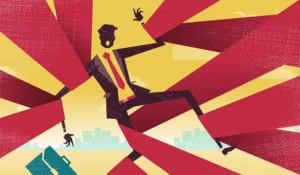When politicians — usually Republicans — and their corporate interests rail against government regulation, we should rightly point to incidents like the Love Canal, the Triangle Shirtwaist Factory Fire, the financial crisis of 2008, the oxycontin epidemic, the Deepwater Horizon disaster, the collapse of the levees in New Orleans during Hurricane Katrina, the Enron scandal, the Flint, Michigan water crisis, the Exon Valdez accident, and many, many more as instances where increased governmental regulation and governance could have prevented disaster.
This happens all the time.
One of the Trump administration’s first acts was to roll back parts of the Clean Water Act. For the first time in decades, landowners and property developers can dump pollutants such as pesticides and fertilizers directly into hundreds of thousands of waterways and destroy or fill wetlands for construction projects.
A primary proponent of this rollback was, not surprisingly, the developers of golf courses.
Of course, too much regulation can also create problems. Needless or overreaching regulation slows down businesses and decreases efficiency and profits, but too little regulation nearly collapsed the world economy. It poisoned the drinking water for an entire city. It allowed for a nationwide opioid epidemic that has taken the lives of half a million Americans.
When we reject regulations as unnecessary interference with business, people get sick, people die, and our environment is poisoned for generations.
Sometimes, “Better safe than sorry” makes for good policy
Just this year, an undercover report from Beijing News sent shock waves through China, alleging that the trucks that ship cooking oil and syrup are also used for fuel and chemicals and are not adequately cleaned between uses.
It’s not the first time this kind of scandal has occurred.
Fuel tankers in China have been caught repeatedly transporting cooking oil in the last two decades.
In 2008, fuel tankers were also found transporting baby formula, which led to a nationwide panic.
Why?
An absence of regulation and enforcement.
Without government oversight, businesses won’t always do the right thing. Believing that the invisible hand of the market will lead firms to make moral and righteous decisions is nonsense. While unnecessary regulation is deleterious to business and should be avoided whenever possible, too little is disastrous.
Too much evidence exists to prove otherwise. Too much damage has been done.
If given the choice, I’d err on the side of too much regulation every time.







